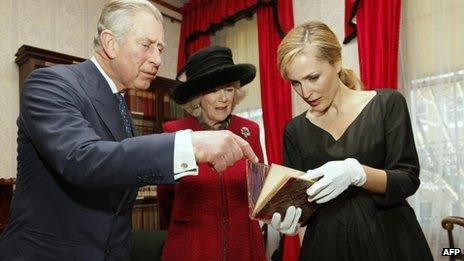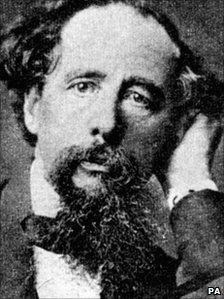World celebrates 200th anniversary of Dickens's birth
- Published
- comments
The Prince of Wales and the Duchess of Cornwall have led global celebrations marking the 200th anniversary of Charles Dickens's birth.
Prince Charles laid a wreath at the author's grave in Poets' Corner as part of a service at Westminster Abbey.
The Royal couple also visited the Charles Dickens Museum in London.
A service also took place in Portsmouth where Dickens was born, with readings by actor and biographer Simon Callow and actress Sheila Hancock.
Meanwhile, a 24-hour "readathon" is taking place in countries from Albania to Zimbabwe.

The Prince of Wales, the Duchess of Cornwall and actress Gillian Anderson examine a first edition of one of Dickens's novels
At St Mary's Church in Portsmouth, Callow read from David Copperfield, a coming-of-age story about an orphan boy that is largely considered to be Dickens's most autobiographical work.
Hancock read from Oliver Twist.
"I really made the strong decision to come to the place where he was born rather than to Westminster Cathedral where he never wanted to be," actor Callow said, referring to Dickens's desire to be buried at Rochester Cathedral, instead of Westminster Abbey, where he was interred following a public outcry.
Celebrations in Portsmouth began earlier in the day at a ceremony outside the writer's birthplace, where his great-great-grandson, Ian Dickens, laid a wreath.
Ahead of the Westminster Abbey service, Prince Charles and Camilla visited the Charles Dickens museum in Doughty Street - which opened in 1925 in the house where the novelist lived from 1837-1839.
US actress Gillian Anderson, who played Miss Havisham in the BBC's adaptation of Great Expectations, gave a private reading for the royal visitors.
She said of the couple: "I was very impressed by how relaxed and how much fun they are. They're very funny and like to have a joke."

Dickens was born in Portsmouth in 1812 and died in Kent in 1870
The Westminster Abbey service was attended by a large gathering of the author's descendants and also included readings from actor Ralph Fiennes, biographer Claire Tomalin, and another great-great-grandson, Mark Dickens.
Fiennes read from Dickens's Bleak House.
Historian Judith Flanders, who attended the service, said: "It was enormously moving" but added that Dickens would have hated it.
"Dickens said in his will that he wanted no public ceremonies, no statues, no public acknowledgement," she said.
The Dean of Westminster, the Very Reverend Dr John Hall, said: "Dickens's humanity and compassion made an extraordinary impact on Victorian England through his writings, which remain immensely popular.
"This bicentenary should help renew our commitment to improving the lot of the disadvantaged of our own day."
The BFI Southbank, in London, is hosting the UK leg of the international readathon which began in Australia with a reading of Dombey and Son and will end with an excerpt from The Mystery of Edwin Drood in the United Arab Emirates.
Susie Nicklin, director of literature at the British Council, which organised the event, said: "We are responding to the huge global demand from audiences in 66 countries with whom Dickens has struck a chord as his themes and characters seem as fresh to them today as they did to British readers in the Victorian era."
Other events include a bi-centenary dinner at the capital's Mansion House on Tuesday night, where Sir Patrick Stewart will deliver a reading, as well as the launch of a Dickens newspaper and iPad app using his work as content.
All members of the Cabinet were presented with copies of Dickens's works by Culture Secretary Jeremy Hunt to mark the author's bicentennial - Prime Minister David Cameron was given Hard Times and Great Expectations.
At the weekend, biographer Claire Tomalin said children did not have the the attention span necessary to appreciate the novelist's works because they were "being reared on dreadful television programmes".
- Published7 February 2012
- Published7 February 2012
- Published5 February 2012
- Published4 February 2012